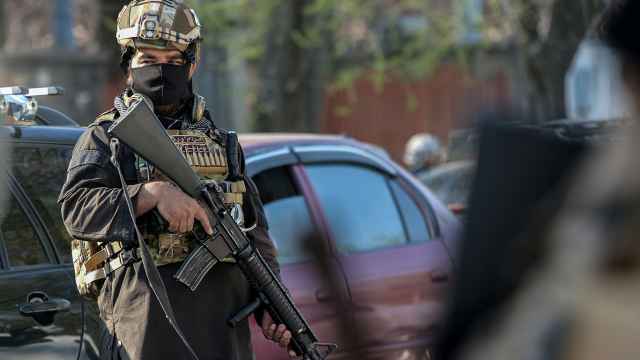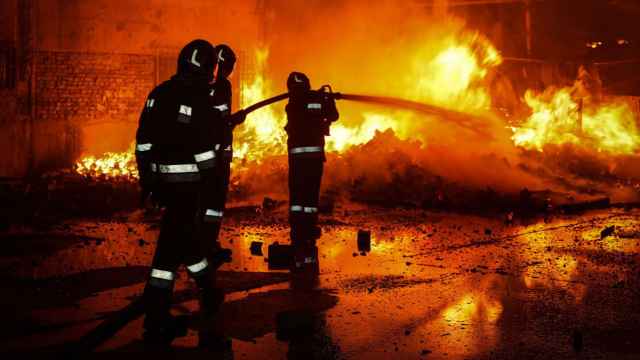Kolya is back in Moscow to interview for jobs. A Russian national, he has just graduated from Liverpool University, where he majored in business but has a long-standing interest in aviation software and has even sold some of his software to Russian carrier Transaero. So far Kolya has had eight interviews and received eight offers, despite the fact that he graduated with a third-class degree from Liverpool (the grade above fail in the British system).
Apart from his obvious skill in programming, which is a sellable skill in any market, Kolya would struggle to get a job in Britain with a third from Liverpool, even in a boom. But God forbid that he went looking in Spain or Portugal, where youth unemployment is now at 50 percent and even students with a starred first in PPE from Oxbridge would struggle to find a job.
Russia's economy is booming even if its businessmen remain glum and nervous about the future, thanks to the never-ending eurozone crisis story. Unemployment is down to a historical low of 5.4 percent of the working population, which, as President Vladimir Putin pointed out at the St. Petersburg International Economic Forum in June, means that all the production capacity is used up.
The tight labor market is already sending wages up, which were rising 14 percent at the end of the first quarter on an annualized basis. And this has fed through into rising confidence and robust growth of retail borrowing, which was up a whopping 43 percent in May.
Indeed, the Kremlin released a whole bunch of economic data this week that show the economy is in robust health (for the moment). The reserve fund was supposed to be emptied by the end of 2010 but is now at just under 2 trillion rubles ($60 billion), and the national welfare fund used to support social spending is over 2.8 trillion rubles.
Russia's external debt is up slightly to $585 billion, slightly more than the gross international reserves of $513 billion as of the end of June, but this still means that Russia can cover its debt nearly dollar-for-dollar with cash, unlike most Western economies that have national debts of about 100 percent of gross domestic product these days. And even capital outflow is finally slowing and is expected to drop to $9.5 billion in the second quarter, following a $43 billion outflow in the first quarter.
All this means that economists are starting to ask whether the economy is overheating. Alexei Ulyukayev, first deputy chairman of the Central Bank, says that when consumer-lending growth rises above 28 percent, the economy is in danger of overheating — and Russia is well beyond that point now.
The danger in this lending is that some analysts are suggesting that the quality of loans is falling, which opens banks up to problems if there is another bad external shock from Europe. However, nearly everyone agrees that if this does happen, the Central Bank has more than enough cash in reserve to prop up the banks and avoid a systemic financial crisis.
The black spot is in the corporate sector, where companies have already started to destock. One of the reasons the 2008 crisis was so painful was that companies were carrying a lot of inventory to meet the burgeoning demand of a booming market. However, when the crisis struck, these companies basically switched off their machines to save money and sold their inventory instead. The result was that the economy came to a stand still literally overnight, resulting in a 7 percent contraction. The process took about six months to complete, after which companies had to turn their machines on again after stocks ran out to meet new orders and the economy began to recover. This time round, fearing another (and possibility worse) meltdown in Europe, companies have already started destocking before the crisis has even appeared.
"As opposed to 2008, when strong consumption was accompanied by overheated industrial production growth, this year we see producers taking a much more cautious approach. In 2010-2011 the recovery in economic growth was at 70 percent, driven by stock building," said Natalya Orlova, chief economist at Alfa Bank. "However, starting in the fourth quarter of 2011, the Russian economy entered a destocking process. According to our estimates, in that quarter inventories contributed minus 0.2 percent to GDP growth and minus 0.4 percent in the first quarter of this year. This was the first sign that the producer started to be cautious earlier than expected."
Russia finds itself in a very weird place now. Kolya's experience and the robust consumer demand mean that the economy is getting hot to the point where inflation is starting to rise. Russia's inflation overshot the Central Bank target last month and left it struggling to keep consumer-price growth below last year's record low as a weaker ruble stokes food costs and utility tariffs rise, economists said.
"What is surprising is how quickly headline inflation has reversed its deceleration," wrote Alexander Morozov, chief economist at HSBC Holdings Plc. in Moscow in a note to clients. "The Central Bank's job of keeping inflation in the range is seen as 'Mission Impossible.'"
But on the other hand, the behavior of companies suggests that the economy is slowing down. Industrial production took a nose dive in March — as it did in the rest of the world as growth collapsed for psychological reasons as much as anything else. This means that the Central Bank should move to bolster confidence and encourage growth.
Put in simple terms, the dilemma is: the Central Bank should increase interest rates to curb inflation and cool the economy, and at the same time it should cut rates to encourage more investment and growth. The upshot of this confusion is that economists are forecasting a wide spread of growth rates this year, from at least 3 percent to 5 percent. When spreads on forecasts get this wide, it always means that the experts are basically clueless about what will happen next.
To be fair, Russia's strong growth is fragile because it is partly connected to the recovery of the oil price, which is currently back at about $100 a barrel. Because of the lack of reforms and investment, high oil prices are pumping money into the economy, which is feeding through to consumer demand. If oil prices fall — an event the government is preparing for by adding a $60 scenario to its budget planning despite assuming an average price of $115 for this year — then that would quickly take the wind out of Russia's sails. But that has always been Russia's problem. Strong consumer demand has encouraged real progress and investment, but it is still nowhere near what is needed.
A Message from The Moscow Times:
Dear readers,
We are facing unprecedented challenges. Russia's Prosecutor General's Office has designated The Moscow Times as an "undesirable" organization, criminalizing our work and putting our staff at risk of prosecution. This follows our earlier unjust labeling as a "foreign agent."
These actions are direct attempts to silence independent journalism in Russia. The authorities claim our work "discredits the decisions of the Russian leadership." We see things differently: we strive to provide accurate, unbiased reporting on Russia.
We, the journalists of The Moscow Times, refuse to be silenced. But to continue our work, we need your help.
Your support, no matter how small, makes a world of difference. If you can, please support us monthly starting from just $2. It's quick to set up, and every contribution makes a significant impact.
By supporting The Moscow Times, you're defending open, independent journalism in the face of repression. Thank you for standing with us.
Remind me later.






